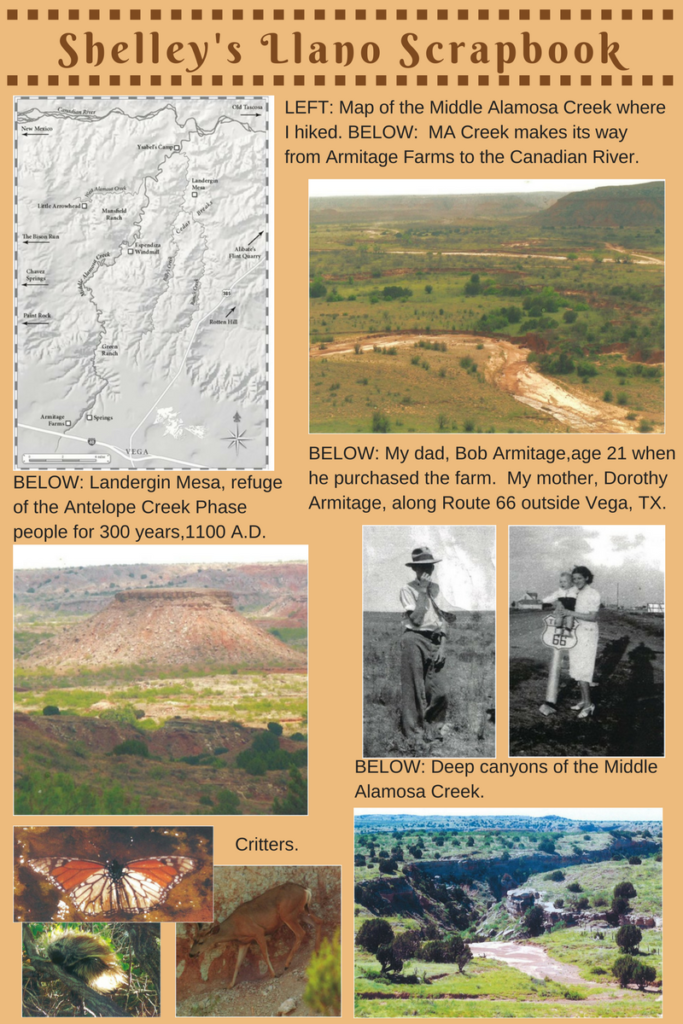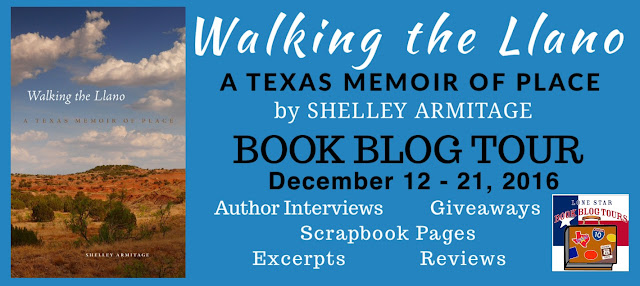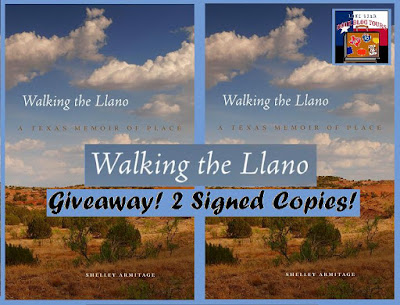WALKING THE LLANO
A TEXAS MEMOIR OF PLACE
by
Shelley Armitage
Genre: Eco-Memoir / Nature
Publisher: University of Oklahoma Press
Date of Publication: February 15, 2016
Number of Pages: 216
Scroll down for Giveaway!
When American explorers arrived in the Texas Panhandle, they dubbed the region the “Great American Desert.” Its rough terrain appeared flat, dry, uninhabitable. Later, cell phone towers, oil rigs, and wind turbines added to this stereotype. Yet in this lyrical ecomemoir, Shelley Armitage charts a unique rediscovery of an unknown land, a journey at once deeply personal and far-reaching in its exploration of the connections between memory, spirit, and place.
Armitage begins her walk by following the Middle Alamosa Creek thirty meandering miles from her family farm to the Canadian River. Growing up in the small llano town of Vega, Texas, she finds the act of walking inseparable from the act of listening and writing. “What does the land say to us?” she asks as she witnesses human alterations to the landscape—perhaps most catastrophic the drainage of the land’s most precious water source, the Ogallala Aquifer.
But the llano’s wonders persist: colorful mesas and canyons, vast flora and fauna, diverse wildlife. While meditating on the region’s history, Armitage recovers the voices of ancient, Native, and Hispano peoples as interwoven with her own: her father’s legacy, her mother’s decline, a brother’s love. The llano holds not only the beauty of ecological surprises but a renewed kinship in a world ever-changing.
Reminiscent of the work of memoirists Terry Tempest Williams and John McPhee, Walking the Llano is a soaring testimony to the power of landscape to draw us into greater understanding of ourselves and deeper connection with the places we inhabit.
CLICK TO PURCHASE:
* Amazon * University of Oklahoma Press *
* Amazon * University of Oklahoma Press *

Check out author Shelley Armitage’s scrapbook page for Walking the Llano!

PRAISE FOR WALKING THE LLANO
“Both an intensely lyrical and intimate scrapbook of familial history and a uniquely sublime travelogue of the American Southwestern landscape” A Starred review from Kirkus
“. . .an enticing mix of memoir, nature study and the hunting of ghosts. [ Walking The Llano] is a testament to the value of slowing down and watching where you are going.” Ollie Reed, The Albuquerque Journal
“. . .[Armitage] is an explorer, and from her book we learn much about people who settled [the llano] and those who must now make gutwrenching decisions about modern methods of energy extraction. . .a perfectly balanced memoir.” Kimberly Burk, The Oklahoman
“With a cleareyed appreciation for landscape and our place in it combined with uncluttered flowing writing, Armitage establishes her place in the tradition of the best American nature writing.” Mark Pendleton, INK
“Once you’ve ambled into the lyrical, evocative pages of Shelley Armitage’s ‘Walking the Llano’, the Plains will never seem plain again.” William deBuys , Author of A Great Aridness: Climate Change and the Future of the American Southwest
“Shelley Armitage’s prose is as poetic as it is intelligent. She masterfully weaves together her personal story with the narrative of the Llano, and she does so in a way that begs the question of what lies ahead for the people and the land she loves. If literature is a study of the human heart—and it is—then Walking the Llano is a quiet masterpiece.” BK Loren, Author of T heft:A Novel and Animal, Mineral, Radical: Essays
“In Walking the Llano, Shelley Armitage does for the Staked Plains what John McPhee did for the Northern Plains in Rising from the Plains. She carefully mines the history, character, and geology of the Llano Estacado and combines it with a compelling personal narrative to create an account that flows with lyricism, authenticity, and wisdom. A splendid and cleareyed book.” Nancy Curtis – Coeditor of Leaning into the Wind: Women Write from the Heart of the West
Dr. Shelley Armitage is Professor Emerita from University of Texas at El Paso where she taught courses in literature of the environment, women’s studies, and American Studies. She is author of eight award winning books and 50 scholarly articles. She resides in Las Cruces, New Mexico but still manages her family farm outside of Vega, Texas.
Armitage grew up in the northwest Texas Panhandle in Oldham County. She owns and operates the family farm, 1200 acres of native grass—once part wheat and milo—bordering Interstate 40 on the south and near the Canadian River breaks on the north. Armitage shared this landscape from her childhood on, riding with her father and grandfather to check crops and cattle and later jogging and more recently walking the farm roads. Though most of her adult life has been spent away from the Panhandle as a university professor, Armitage has always returned to the “farm” which offered until recently a 360-degree view of earth and sky. Wind energy farms, oil and gas, microwave towers, and strip mining have greatly altered her childhood landscape.
Throughout her distinguished university career, Armitage’s professional life offered her a connection with landscape. Because of senior Fulbright teaching grants in Portugal and Finland, a Distinguished Fulbright Chair in American Literature in Warsaw, a Distinguished Fulbright Chair in American Studies in Budapest as well as research, writing, and teaching in Ethiopia, the American Southwest, and Hawai’i, place has taken on special meanings. As the Dorrance Roderick Professor at University of Texas at El Paso and a Distinguished Senior Professor in Cincinnati, she decided in her most recent book to write about the meaning of home place as connected to the land’s own ecological and human stories.
As the holder of three National Endowment for the Humanities grants, a National Endowment of the Arts grant, and a Rockefeller grant, Armitage nevertheless prizes a recent recognition from the United States Department of Agriculture most highly. Commended for her “commitment to the spirit, principles, and practices” of the Conservation Reserve Program, Armitage has restored the farm to grassland in an effort to heal fragmented landscapes by recreating wildlife corridors and habitat. Like the fragmented narratives of stories lost, she says: “If we could read the land like a poem, we might more intimately learn from it, understand what it says of natural and human cycles—and that sometimes uneasy relationship between them.”
—————————————
GIVEAWAY! GIVEAWAY! GIVEAWAY! GIVEAWAY!
2 Winners Each Win a Signed Copy of the Book
(US ONLY)
December 12 – December 21, 2016
CHECK OUT THE OTHER GREAT BLOGS ON THE TOUR:
|
12/12
|
Excerpt 1
|
|
|
12/13
|
Review
|
|
|
12/14
|
Author Interview 1
|
|
|
12/15
|
Scrapbook Page 1
|
|
|
12/16
|
Review
|
|
|
12/17
|
Excerpt 2
|
|
|
12/18
|
Author Interview 2
|
|
|
12/19
|
Review
|
Country Girl Bookaholic
|
|
12/20
|
Scrapbook Page 2
|
|
|
12/21
|
Review
|
Note: Some posts may contain affiliate links. Should you choose to purchase a product, we will receive a small commission for the sale at no additional cost to you. Chapter Break is a participant in the Amazon Services LLC Associates Program, an affiliate advertising program designed to provide a means for sites to earn advertising fees by advertising and linking to Amazon.com.

Subscribe to Chapter Break posts.
Join 561 other subscribers











Having grown up in Lubbock, this book really appeals to me. And I know this area well since I travel through the northern panhandle from Colorado to Lubbock when I visit home. I do think the landscape is gorgeous and I didn’t appreciate it as much when I lived there as I do now that I’ve moved away. Thanks for sharing this book!
Bookworm Brandee recently posted…That’s What HE Said #71 ~ Thirsty Thursday & Hungry Hearts #52
Thanks, Brandee! I hope you check this book out!